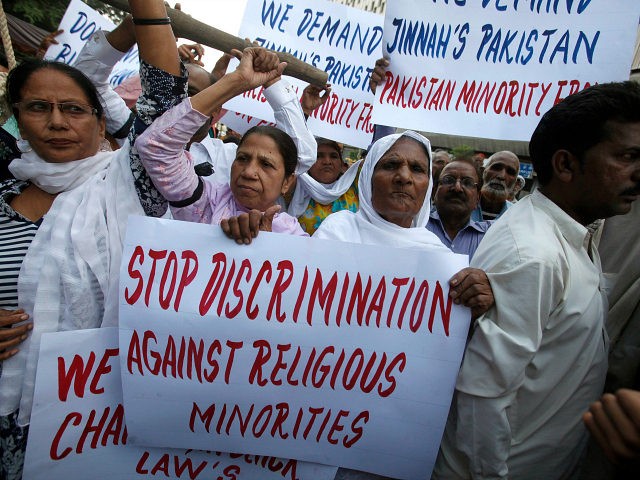The plight of Christian minorities suffering persecution in Muslim-majority nations is on the brink of being forgotten, indicated the chairman of the U.S. Conference of Catholic Bishops’ (USCCB) Committee on International Justice and Peace.
“They are threatened to be displaced completely,” cautioned Bishop Oscar Cantu of Las Cruces, New Mexico, referring to Christian minorities in predominantly Muslim countries in the Middle East, noting that the religious group has been in the region for thousands of years.
“It has often been said that Christianity can live without the Middle East, but that the Middle East cannot live without Christianity because it is such an ancient presence and moderating influence in the region,” he added.
Cantu’s comments came during a press conference on November 13, the first day of USCCB’s annual fall general assembly gathering in Baltimore, Maryland.
“It is important that the church tell their stories … give the Christian minority a voice,” said the bishop.
On November 26, the bishops will observe “A Day of Prayer for Persecuted Christians” to highlight the predicament of minority Christians in Asia, Africa, and the Middle East, reports the Catholic News Service (CNS).
The day of prayer will mark the beginning of USCCPBs “Solidarity in Suffering” initiative, a week of awareness and education focused on the distress experienced by Christian minorities.
In a joint statement issued November 9 with Cardinal Daniel DiNardo, the USCCB president, Bishop Cantu said, “The solemnity of Christ the King is a fitting time to reflect on religious freedoms and persecution.”
The United Nations and the United States have determined that Christians and other ethnoreligious minorities have been victims of genocide at the hands of the Islamic State (ISIS/ISIL) and other jihadist groups.
“Christians and other religious and ethnic minorities have suffered greatly at the hands of the Islamic State and various extremist groups,” noted the bishops’ conference in a statement. “They have been attacked and killed, women and girls raped, churches destroyed or desecrated, homes and properties looted. Thousands have been displaced, some multiple times, fleeing with just the clothes on their backs.”
During the press conference this week, Bishop Cantu acknowledged that “there are countries that fund and support” jihadist groups known to target Christians.
A report authored by the Aid to the Church in Need — titled “Persecuted and Forgotten?” — identified Nigeria, Sudan, Eritrea, Egypt, Saudi Arabia, Syria, Turkey, Iran, Iraq, Pakistan, India, China, and North Korea as hostile states towards Christians.
“The defeat of Daesh [ISIS] and other Islamists in major strongholds of the Middle East offers the last hope of recovery for Christian groups threatened with extinction,” noted the report. “Many would not survive another similar violent attack.”
Government oppression of Christians is not limited to the countries identified in the report.
The Pew Research Center found that the number of nations where Christians faced persecution had grown from 108 in 2014 to 128 in 2015.
Moreover, Open Doors, which monitors Christian persecution across the world, reports that, in 2016, “More than 200 million Christians in the 50 countries where it is most difficult to be a Christian experience persecution because of their faith.”
Various experts, including former Rep. Frank Wolf (R-VA), the co-founder of the 21st Century Wilberforce Initiative, a religious freedom organization focused on helping persecuted religious minorities, believe Christianity in Iraq — the cradle of Christendom — is at risk of disappearing.
Echoing Pope Francis, Wolf has urged the United States and the international community at large to take “bold action” to prevent Christianity in the Middle East from disappearing in just “a few short years.”
The pope has denounced the persecution, torture, and murder of Christians across the Middle East, calling on the international community “to do all that it can to stop and prevent further systematic violence against ethnic religious minorities and to protect innocent people.”
Despite the more than $1.6 billion in U.S. humanitarian assistance and reconstruction aid to Iraq provided through the United Nations Development Program (UNDP), the funds have failed to reach Christian communities.
Without U.S. taxpayer-funded aid, the Christian communities will not be able to rebuild the destroyed infrastructure in their historical Iraqi homeland, Stephen Rasche, legal counsel for the Chaldean Catholic Archdiocese of Iraqi Kurdistan, told American lawmakers last month.

COMMENTS
Please let us know if you're having issues with commenting.